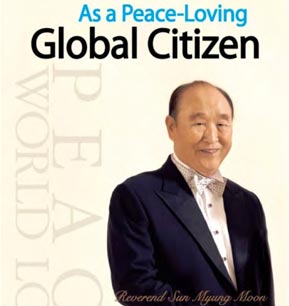ShareThis
Rev. Sun Myung Moon

As a Peace-loving Global Citizen is the autobiography of Rev. Sun Myung Moon, the founder of the Unification Movement. It was published in 2009 in both Korean and English by Gimm-Young Publishers of Seoul, South Korea. The book was released in South Korea on March 9, 2009 and debuted at #3 on the Businesss bestseller's list. It has ranked in various bestseller lists since then and was ranked 15th on the General bestseller's list as of October 14, 2009.
A Single Dandelion Is More Precious Than Gold
In addition to being a habitat for many plants and animals, the Pantanal is also an important source of oxygen for the earth. It is the “lungs of the world” and “nature’s sponge,” producing more oxygen than any other area. It is also a storehouse of greenhouse gases. The Pantanal is changing rapidly, however, due to industrial development. If the Amazon region, which provides such a large amount of oxygen for the earth, is destroyed, the future of humanity will be dismal.
Some thirty-six hundred species of fish live in the Pantanal. One is a gold-colored fish called the dorado, which usually weighs more than forty pounds. When a dorado first took my hook, it felt like my body was being sucked into the river. As I was reeling in the line with all my strength, it jumped out of the water several times. After several jumps it still had plenty of strength left to fight. It was so strong it seemed more like a bear or a tiger than a fish.
The lakes in the Pantanal are always clean. No matter what is put into the water, it quickly becomes clean again. The water is cleansed quickly because there are so many different species of fish living there. Each species feeds on something different. Living together in a complex system, they devour anything that dirties the water. Their act of feeding has the function of keeping the water pure. Fish are very different from human beings. The fish don’t live for their own sake. They live to clean their environment and make it better.
The back of a water hyacinth’s leaf in the Pantanal wetlands is black with bugs. If the bugs were to remain there, the hyacinth would not be able to live, but there are fish that eat those bugs off the leaves. So the bugs live, the hyacinth lives, and the fish live. This is what nature is like. No creature lives for itself. Instead, they live for each other. Nature teaches us this tremendous lesson.
No matter how many fish there are in the Pantanal, if people are given the freedom to fish there, the population is bound to decrease. To protect the fish we need to develop fish farms. Because the fish in the Pantanal are so precious, we need to develop many fish farms. Similar facilities to protect insects, birds, and mammals are also needed. Raising insects will help increase the bird population. The Pantanal provides a perfect environment for all these creatures, and by focusing on how to increase their population humankind can continue to enjoy them for centuries to come.
Wednesday, December 15, 2010
|
Labels:
A Single Dandelion Is More Precious Than Gold part2
|
CONTENT
- FOREWORD
- CHAPTER ONE - Food is Love
- CHAPTER TWO - A River of Heart Flows with Tears
- CHAPTER THREE - The Man with the Fullest Stomach
- CHAPTER FOUR - Why We Work Globally
- CHAPTER FIVE - True Families Create True People
- CHAPTER SIX - Love Will Bring Unification
- CHAPTER SEVEN - Future of Korea, Future of the Wor...
- CHAPTER EIGHT - Message for Young People

